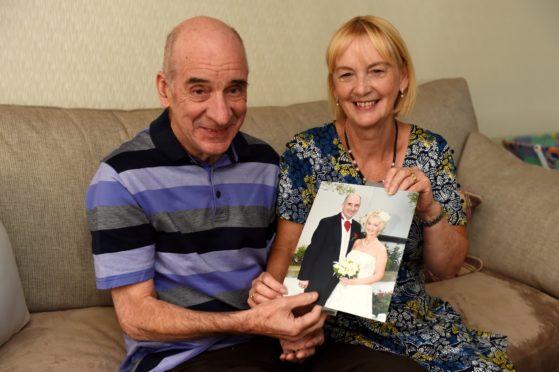One of the most heartwarming stories of recent years surfaced last week with news that well-known Aberdeen magician Bill Duncan had remarried his wife, Anne, because the ravages of advanced dementia meant he could not remember their first wedding 12 years earlier.
Their story has since gone viral on social media and has been picked up by newspapers and television stations worldwide. Quite apart from providing a little light relief from the incessant flow of bad news, the wedding of Bill and Anne has helped raise awareness of dementia, showing not only the terrible strain the illness places on sufferers and their loved ones but also the fact that a quality of life is possible with the right attitude and approach.
I have known Bill for many years, often bumping into him at the many functions we both attended as part of our respective jobs. I have also known Anne’s son, Colin, for years, but had never realised the link between him and Bill until Colin shared his mother’s new wedding album on Facebook. Between them, the newly-weds are now doing so much for dementia sufferers in Aberdeenshire through their lunchtime Boogie in the Bar events, which provides music and dancing to old-time favourites such as Elvis and Bill Haley and the Comets. A truly remarkable couple.
A peculiarly French disease appears to have crossed the Channel into the UK. For as long as I can remember, summer holidays for tens of thousands have been threatened or destroyed because workers in the country’s airline sector chose to go on strike, knowing the additional leverage their actions – or should that be inactions? – would create at such a sensitive time of year.
Now pilots employed by British Airways are threatening to wreak the same kind of havoc by announcing three one-day strikes next month. Their union, The British Airline Pilots’ Association (Balpa), claims the pilots had “no choice but to call this action” because BA had refused to submit to proposals which could have averted a strike. That claim will raise a few eyebrows, given that the offer on the table amounted to an increase of 11.5% over three years, which would have seen a captain’s average pay increase to more than £200,000 a year.
To compound the misery their action will inflict on people who can only dream of earning money like that, the pilots have secured the services of an accomplice, in the form of the airline itself. BA has sent out emails to thousands of customers warning them that their flights have been, or are likely to be, cancelled. The problem is they appear to have adopted a scattergun approach to communications and have sent the email to people whose flights will not be affected. Their customer service team then appears to have gone on holiday, leaving customers, angry, frustrated and starved of information. One man claims to have phoned over 100 times without receiving an answer.
I am old enough to remember the days when BA was the airline of choice for travellers, culminating in it being awarded the accolade of the World’s Favourite Airline in the 1990s. How times have changed. It seems to have gone out of its way to make flying as stressful as possible unless you happen to be rich enough to fly first-class – a luxury beyond the means of all but the highest earners. Such as airline pilots.
While on the subject of travel, MP Jamie Stone has come up with a classic brainwave to solve the undoubted problem of heavy traffic on the NC500 tourist route through the Highlands. He suggests a toll – and at one point mentioned a figure of £25 – on “non-local”, heavy vehicles, such as camper vans and motorhomes using the route. Bizarrely, he claims this would “in no way” impact local drivers, but would bring in much-needed revenue to improve the route, much of which is single-track.
What Mr Stone, whose Caithness, Sutherland and Easter Ross constituency hosts much of the NC500, fails to explain is just how a toll which discriminates between local and non-local drivers could possibly work without some kind of checkpoint where driver and vehicle details would be checked and the toll levied. That in itself would significantly slow the traffic flow which is what concerned Mr Stone in the first place, and local drivers would be disproportionately disadvantaged because time is not an issue for most holidaymakers, whereas it clearly is an issue for those using the route for personal or professional business reasons.
Rather than concocting hare-brained, unworkable schemes such as this, Mr Stone would be better advised giving some thought to how the Highlands could reap the full benefit of greatly-increased tourism by improving even further the attractions and facilities along the route in a way which does not penalise visitors and does not give the impression that they – and their money – are not welcome. It is supremely ironic that a Liberal Democrat MP should propose a scheme which is neither liberal nor democratic. Back to the drawing board, Mr Stone.
Derek Tucker is a former editor of the Press and Journal

